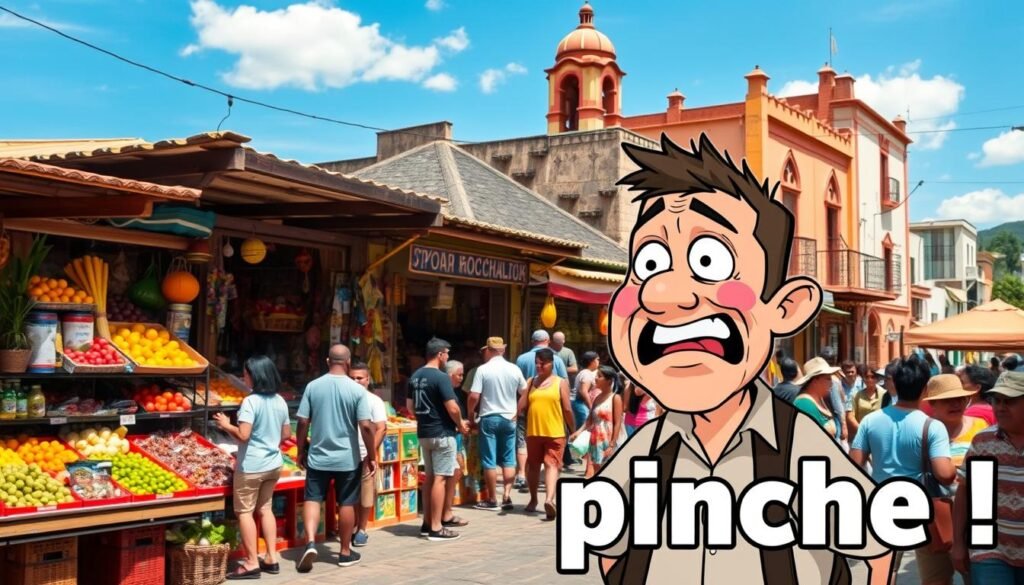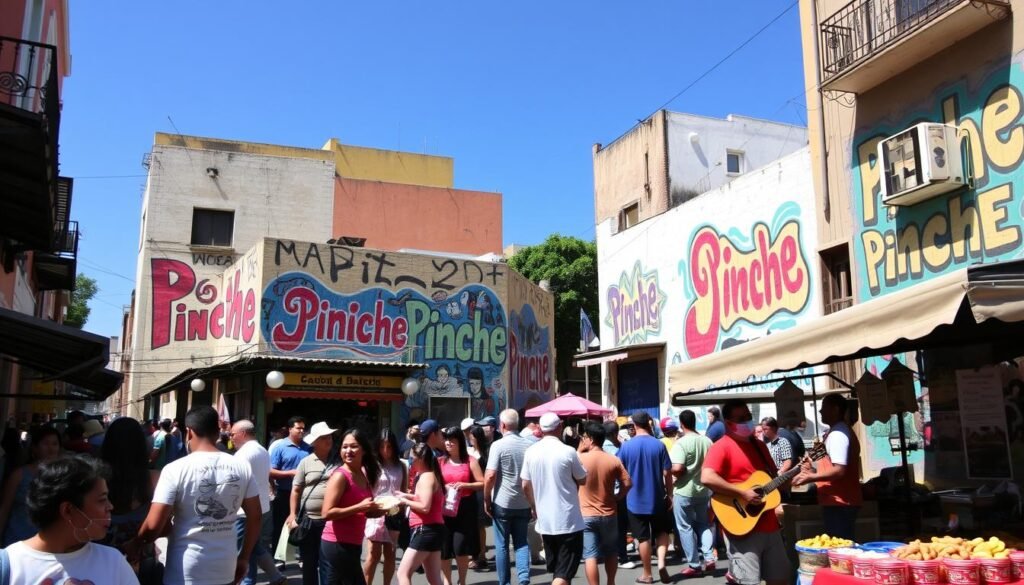Pinche Spanish: Meaning and Usage in Latin America

The Spanish slang term “pinche” is common in Latin America, especially Mexico and Central America. It’s a versatile word with meanings ranging from “goddamned” to “fucking”. This powerful term has become a significant part of regional speech.
“Pinche” originally meant “kitchen worker” or “servant”. Over time, it evolved into a pejorative term. Now, it’s a staple of informal, often profane Spanish speech.
Understanding “pinche” is crucial for navigating Latin American culture and language. Its usage varies by context and can carry strong, offensive connotations.
Key Takeaways
- Pinche is a versatile Spanish slang term with a range of meanings, from “goddamned” to “fucking”
- The term originated as a reference to a “kitchen worker” or “servant” but has evolved into a common profanity
- Pinche is widely used in informal speech across Latin America, particularly in Mexico and Central America
- The term can carry strong, offensive connotations, making it an important part of regional linguistic and cultural understanding
- Navigating the nuances of pinche Spanish is crucial for effective communication in Latin American contexts
Introduction to Pinche Spanish
Spanish is a diverse language with many regional dialects. It has countless expressions that showcase cultural differences across Spanish-speaking countries. The profane slang word “pinche” is widely used in Latin America, especially Mexico and Central America.
Overview of the Profane Spanish Slang Term
“Pinche” originally meant “kitchen worker” or “servant.” Over time, it evolved into a vulgar term with various derogatory meanings. These include “goddamned,” “shitty,” and “fucking.”
This profane slang is common in everyday speech and popular culture. Its widespread use shows its importance in Latin American linguistic and cultural expression.
Its Prevalence in Latin American Culture
- The term “neta” or “la neta” means “for real” or “the honest truth” and is commonly used in Mexican slang.
- “Varo” is used to mean “money” in Mexican slang, especially among younger individuals.
- “Paro” means “a favor” in Mexican slang and is used to ask for help or a favor.
- “Güey” translates to “bro” or “stupid person” depending on the context in Mexican slang.
- “Carnal” is used to refer to a close friend or like a brother in Mexican slang.
| Slang Term | Meaning |
|---|---|
| “Te pasaste” | Means “you went too far” in Mexican slang, denoting crossing a line or being excessive. |
| “Chido” | Translates to “cool” and is used to describe something positively in Mexican slang. |
| “Huevo” | Has various meanings in Mexican slang including “without a doubt” and “being lazy”. |
| “Pedo” | Has multiple meanings in Mexican slang such as “fart”, “what’s up”, “hassle”, and “problems”. |
| “Pinche” | Is often used as an adjective in Mexican slang to accentuate the following word. |
Pinche Spanish and other profane slang are everywhere in Latin American culture. This shows how lively and expressive Spanish can be. It highlights the region’s rich language history and vibrant social interactions.
The Literal Meaning of Pinche
“Pinche” in Spanish originally meant a kitchen worker or servant. It comes from the word for scullion, someone who does basic kitchen tasks. This simple meaning led to its evolution into a harsher slang term.
“Pinche” is now often used as a substitute for “fucking” in Latin American cultures. It can describe something as “shitty” or “goddamned”. People also use it as an intensifier, like in “pinche cabrón” (fucking asshole).
The term’s usage varies by region. In south Texas, it refers to stingy people. In Mexico City, it describes poor quality or bad taste. For example, “¡Eso está muy pinche!” means “That’s very shitty!”
| Region | Meaning of “Pinche” |
|---|---|
| South Texas | Refers to people who are tight with their money |
| Mexico City | Determines poor quality or bad taste |
| Sinaloa, Mexico | Milder connotation, meaning “worthless” rather than “fucking” |
“Pinche” has changed a lot over time. It started as a word for a simple kitchen worker. Now, it’s a common swear word in Latin American Spanish.
Pinche Spanish: The Vulgar Connotations
The term “pinche” has various vulgar meanings in Spanish-speaking regions. It’s often used as an intensifier to express strong displeasure or anger. Its profane connotations make it potentially offensive in formal settings.
“Pinche” has diverse uses across Latin America. In Puerto Rico, it’s a clothespin. In Colombia, it means putting on airs. South Texas uses it for stingy people.
In Sinaloa, Mexico, some consider it to mean “worthless.” This diversity shows the cultural specificity of pinche Spanish across regions.
“The value of items, like The Simpsons figurines, can be significantly different based on rarity, with the Bumblebee Man figurine fetching $75 on eBay compared to a $7 store price.”
“Pinche” has varying connotations from mild to vulgar. This reflects the richness of pinche Spanish in Latin American contexts. Its impact on language and culture is significant.
“Pinche” is widely used in movies, TV shows, and music. This highlights its prominence in pinche Spanish. Media portrayals, like in The Simpsons, increase understanding of Hispanic culture.
Regional Usage and Variations
“Pinche” carries different meanings across Spanish-speaking regions. In Mexico and Central America, it’s a strong negative term. It’s often used to add emphasis to phrases.
Pinche in Mexico and Central America
In Mexico, “pinche” is a common slang word. It can mean “goddamned,” “shitty,” or “fucking.” It’s often paired with other profane terms for extra impact.
Mexican Spanish is known for its colorful slang. Words like “güey,” “chido,” and “padre” are used to express coolness or approval.
Central American countries also use “pinche” frequently. Here, it’s mainly used to emphasize the speaker’s feelings.
Pinche in the United States Spanish Dialects
In the U.S., “pinche” takes on new meanings. It can describe something as “cheap” or “stingy.” This shows how the term varies across Spanish-speaking communities.
| Region | Common Usages of “Pinche” |
|---|---|
| Mexico | “Goddamned,” “Shitty,” “Fucking” |
| Central America | Intensifier, Adding Emphasis |
| United States | “Cheap,” “Stingy” |
The use of “pinche” varies across Spanish-speaking cultures. It continues to change within different cultural settings. This reflects the complexity of this profane slang term.

Pinche as an Intensifier
“Pinche” is a powerful word in Spanish slang. It’s often used to make negative or insulting words stronger. For example, “pinche cabrón” means “fucking asshole” in English. This phrase shows how “pinche” can make insults even harsher.
“Pinche” is very common in Mexican Spanish. It’s a big part of how people talk there. The word can show many feelings, from being annoyed to really hating something. But be careful! Using “pinche” in formal settings is rude.
The way “pinche” is used shows how language changes over time. It’s a good example of how local slang can become important. In Mexico, “pinche” helps people express themselves and their culture.
Understanding words like “pinche” helps us learn about different Spanish-speaking areas. It shows how rich and complex the Spanish language can be. Knowing these words can help us understand Spanish culture better.
Pinche Spanish in Popular Culture
“Pinche” is deeply rooted in Latin American culture. It appears in movies, TV shows, and music. The term adds authenticity and cultural identity to media.
The 2014 song “Collard Greens” by Schoolboy Q features “pinche cabrón”. This phrase intensifies the artists’ message. It shows how “pinche” has been widely accepted in popular culture.
In 2013, a Las Vegas restaurant named “Pinches Tacos” sparked controversy. The term’s use in business raised questions about appropriateness. This debate highlighted the complex nature of “pinche” in society.

“Pinche” Spanish has become a recognizable part of Latin American culture. It appears in various media forms. This term shows how language evolves and shapes popular culture.
pinche spanish
Pinche is a powerful Spanish slang term deeply rooted in Latin American culture. It has evolved from its original meaning of kitchen worker or servant. Now, it’s a versatile word with various connotations.
In North and Central America, especially Mexico, pinche expresses strong displeasure or frustration. It can add emphasis to conversations or inject humor. The term also provides a cultural element to communication.
Pinche’s flexibility is clear in its many meanings within Mexi-Spanish. It can mean “bitch,” “dumbass,” “fucking,” or “shitty.” This adaptability has made it a staple in Spanish-speaking communities.
The term is widespread in the US, particularly in areas with large Spanish-speaking populations. Its popularity has led to controversies. For example, a Las Vegas restaurant owner was asked to rename “Pinches Tacos.”
Pinche offers a unique linguistic and cultural experience in Mexi-Spanish. It provides flair and immersion for those who understand its nuances. Its versatility has cemented its place in Latin American speech.
| Meaning | Context |
|---|---|
| Bitch (insult) | Referring to someone in a derogatory manner |
| Mean | Describing a person or situation as unpleasant |
| Dumbass | Insulting someone’s intelligence or competence |
| F*ck! (cuss word) | Expressing strong frustration or anger |
| F*cking (another cuss word) | Adding emphasis to a statement or description |
| Sh*tty (colloquialism) | Describing something as unpleasant or of poor quality |
| Fantastic (could be a colloquialism) | Expressing positive sentiment or approval |
The Controversy Around the Term
“Pinche” in Latin American culture has sparked debates, especially in business names. Some see it as clever wordplay, referencing its kitchen-worker meaning. Others find it highly offensive and inappropriate.
The debate over “pinche” in business names, like Las Vegas restaurant “Pinches Tacos,” shows differing views. It reflects ongoing tensions around this profane Spanish slang term.
Debate Over Using Pinche in Business Names
Using “pinche” in business names is controversial. Some argue it adds a playful element nodding to its culinary origins. Others strongly object, seeing it as disrespectful for public-facing enterprises.
This debate shows the complexities of “pinche” and its cultural perceptions. It highlights differing views on its acceptability in various contexts.
| Perspective | Argument |
|---|---|
| Embracing Pinche | The term is a playful reference to its original meaning as a kitchen worker or servant, adding a touch of quirky charm to a business name. |
| Rejecting Pinche | The use of such a vulgar and offensive term in a business name is unacceptable and disrespectful, undermining the establishment’s credibility and inclusivity. |
The “pinche” debate in business names shows the term’s complex cultural context. It highlights the need for a nuanced understanding of its evolution.
As Spanish speakers grapple with this profane slang, the discussion remains complex. It touches on cultural sensitivity, language evolution, and business ethics.
Toning Down Pinche Spanish
“Pinche” is known for its vulgar connotations in Latin American culture. However, it can have milder meanings in certain contexts. In some U.S. Spanish dialects, “pinche” has evolved to mean “cheap” or “stingy”.
This softer use of “pinche” shows the mix of Latin American and American English influences. The word’s flexibility allows for less offensive interpretations in specific situations.
This linguistic shift highlights how toning down pinche spanish creates milder meanings. It shows the changing nature of language in diverse Spanish-speaking communities.
Milder Meanings Like “Cheap” or “Stingy”
| Pinche Spanish Term | Milder Meaning | Example Usage |
|---|---|---|
| Pinche | Cheap, Stingy | “Ese restaurante es bien pinche, no valen la pena los precios.” | Pinche Dinero | Cheap, Unimportant Money | “No te preocupes por ese pinche dinero, es solo unos pesos.” | Pinche Cosa | Insignificant, Unimportant Thing | “Esa pinche cosa no me interesa, tengo cosas más importantes que hacer.” |
Language changes to fit different communities. The word “pinche” shows how flexible and adaptable language can be. It reflects the cultural mix in diverse Spanish-speaking groups.
“The versatility of the word ‘pinche’ allows for these less offensive interpretations in specific situations, highlighting the nuanced nature of language within diverse Spanish-speaking communities.”
Other Meanings in Different Spanish Dialects
“Pinche” has diverse meanings across Spanish-speaking regions. In Chile, it can mean a hairpin or romantic couple. Spain uses it for gambling stakes or antes.
Some Latin American countries use “pinche” as a profanity, similar to Mexico. In parts of the US, it can mean “cheap” or “stingy”. Usage varies based on regional dialects and culture.
| Country | Meaning of “Pinche” |
|---|---|
| Chile | Hairpin or romantic couple |
| Spain | Stake or ante in gambling |
| United States (Spanish-speaking regions) | Cheap or stingy |
These varied interpretations show the term’s nuanced nature. Its meanings change significantly across the Spanish-speaking world. This reflects the rich linguistic diversity of Spanish dialects.
“Pinche” can express strong displeasure or describe harmless objects. It shows the complexity of Spanish slang. Understanding regional differences is key to grasping pinche meanings in various dialects.
Conclusion
“Pinche” Spanish has become a cultural cornerstone in many Latin American countries. It started as a term for “kitchen worker” but now has various vulgar meanings. The word’s widespread use in daily life and media has sparked debate.
Grasping the subtleties of “pinche” is key to understanding Latin American culture. Its evolving usage reflects the dynamic nature of Spanish slang. The term highlights the rich diversity of language in Latin America.
“Pinche” plays a complex role in Spanish-speaking cultures. It reveals much about linguistic and social dynamics across Latin America. The word’s journey shows how language can change and adapt over time.
FAQ
What is the meaning and usage of the term “pinche” in Spanish?
“Pinche” is a versatile Spanish slang term popular in Latin American countries. It’s considered a strong swear word with meanings ranging from “goddamned” to “fucking”. The term is most commonly used in Mexico and Central America.
Where does the term “pinche” come from?
“Pinche” originally meant “kitchen worker” or “servant”. Over time, it evolved to have negative connotations.
How is “pinche” used in Latin American culture?
“Pinche” is deeply rooted in Latin American culture, especially in Mexico and Central America. It’s often used in daily speech to express strong negativity or displeasure.
What are the common meanings of “pinche” in Spanish?
“Pinche” is an intensifier expressing strong displeasure, anger, or frustration. It’s similar to “goddamned,” “shitty,” or “fucking” in English.
How does the usage of “pinche” vary across different Spanish-speaking regions?
In Mexico and Central America, “pinche” conveys intense negativity. In the United States, it can also mean “cheap” or “stingy”. Usage and connotations vary across different Spanish-speaking regions.
How is “pinche” used as an intensifier in Spanish?
“Pinche” often intensifies other profane or derogatory terms. For example, “pinche cabrón” translates to “fucking asshole”.
How is “pinche” represented in popular culture?
“Pinche” frequently appears in Latin American popular media. You can hear it in movies, TV shows, and music.
Has the use of “pinche” in business names sparked any controversies?
Using “pinche” in business names has caused debates. The Las Vegas restaurant “Pinches Tacos” is one example. Some see it as clever wordplay, while others find it highly offensive.
Are there any milder or less derogatory meanings of “pinche” in certain contexts?
In some contexts, “pinche” can mean “cheap” or “stingy”. This milder usage is more common in certain Spanish dialects, particularly in the United States.
Are there any other meanings of “pinche” in different Spanish dialects?
“Pinche” has different meanings across Spanish-speaking regions. In Chile, it can mean a hairpin or a romantic couple. In Spain, it might refer to a gambling stake.





